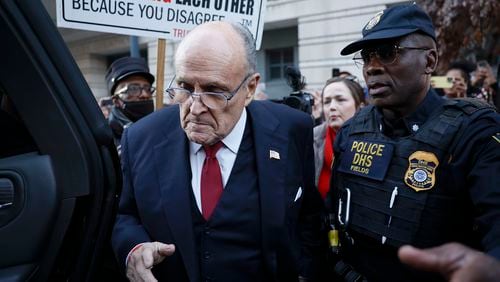Election-related criminal cases against Donald Trump and others have stalled in Georgia and Washington, but defamation lawsuits against those who spread false voting fraud allegations continue to notch victories.
Last week a company behind the film “2000 Mules” apologized to a Gwinnett County man for falsely accusing him of voting fraud as part of an undisclosed lawsuit settlement. One America News Network recently settled a defamation lawsuit brought by a voting technology company. And another right-wing media outlet, the Gateway Pundit, filed for bankruptcy as it fends off a similar lawsuit.
Those developments follow December’s $148 million verdict against former Trump attorney Rudy Giuliani and last year’s whopping $787.5 million settlement that another voting technology company won from Fox News. Numerous other defamation lawsuits related to Georgia voting fraud claims also are advancing.
First Amendment lawyers say there’s a reason the lawsuits have been successful to date: The fraud allegations are demonstrably false.
“Defamation lawsuits are incredibly hard to win,” Atlanta lawyer Gerry Weber said. “The fact that they are being won consistently with large verdicts is an indicator of how blatantly false a lot of these statements are and how verifiably false they are.”
False voting fraud allegations were key to Trump’s effort to try to overturn Joe Biden’s victory in the 2020 presidential election. They fueled scores of unsuccessful lawsuits that sought to overturn the election in Georgia and other states Biden won.
They also fueled Trump’s efforts to persuade state legislators and Vice President Mike Pence to overturn Biden’s victory.
State and federal investigators quickly debunked allegations of ballot stuffing, fake ballots, dead voters and other allegations. They found no evidence of enough fraud that would have changed the outcome of the election. But Trump and others continued to repeat the allegations long after they had been disproved.
Trump’s attempt to overturn Biden’s victory prompted U.S. Justice Department special prosecutor Jack Smith to charge the former president with four felony counts in August. Fulton County District Attorney Fani Willis quickly followed with charges against Trump and 18 others.
But the federal case is on hold until the Supreme Court decides whether Trump is immune from prosecution. And the Fulton case has ground to a halt while the Georgia Court of Appeals decides whether Willis should be disqualified because she had a romantic relationship with one of her top prosecutors.
But private lawsuits against those who spread false voting fraud claims are moving forward. Those lawsuits have accused numerous individuals and companies of defamation — communicating false information that damages someone’s reputation.
Last week Salem Media Group apologized to Gwinnett County resident Mark Andrews, who was accused in the 2022 film “2000 Mules” of illegal ballot “harvesting” (delivering multiple ballots at once to a drop box). The secretary of state’s office found Andrews was delivering ballots for himself and family members, which is allowed under Georgia law.
Andrews filed a defamation suit against publisher Salem Media and the film’s producers — conspiracy theorist Dinesh D’Souza and the group True the Vote — saying he received numerous threats because of the film. Salem apologized as part of an undisclosed settlement, saying it had relied on the producers’ representations and would no longer distribute the film and associated book.
The lawsuit continues against the other defendants. True the Vote issued a statement calling Andrews’ lawsuit “meritless” and saying it stands by its “processes and methodologies, which are sound and accurate.”
Salem Media isn’t the only one settling defamation lawsuits. Two years ago One America News reached an undisclosed settlement with former Fulton County election workers Ruby Freeman and Shaye Moss for spreading Trump’s claim that they committed election fraud. As part of the settlement, the network admitted the workers did not commit fraud.
OAN also recently settled with Smartmatic, a company that became a target of false claims that voting technology was used to flip votes from Trump to Biden. And last year Fox News agreed to pay $787.5 million to Dominion Voting Systems for spreading similar false allegations. Evidence showed Fox knew the allegations were false but aired them anyway.
One high-profile case has gone to trial. A jury ordered Giuliani to pay Freeman and Moss $148 million for repeatedly accusing them of voting fraud long after state and federal investigators had cleared the workers of wrongdoing.
At the December trial, Freeman and Moss testified about how Giuliani’s lies upended their lives. They endured death threats and harassment, and Freeman fled her home on the advice of the FBI.
Giuliani later filed for bankruptcy and has appealed the verdict. Last month he agreed to stop accusing Freeman and Moss of fraud to settle a second defamation lawsuit.
Other defamation lawsuits are pending. Freeman and Moss have sued the Gateway Pundit — which recently filed for bankruptcy — for spreading the false accusations against them. Dominion and Smartmatic also have pending lawsuits against Giuliani, attorney Sydney Powell and others.
Clare Norins, director of the University of Georgia’s First Amendment Clinic, said defamation claims were on the rise before the 2020 election. She said social media and other electronic communication have made it easier for false statements to be distributed widely.
Norins said the damage caused by false statements goes beyond the people immediately affected. One example: Surveys have consistently shown most Republicans believe the 2020 election was rife with fraud — despite voluminous evidence to the contrary.
“Even if you win a defamation claim and are awarded a large amount of damages, it doesn’t necessarily put the genie back in the bottle,” Norins said. “Some people will continue to believe the false information that the lawsuit was based on.”
Norins fears America may be headed for another round of false voting fraud claims during this year’s presidential election. Weber hopes the proliferation of defamation lawsuits will deter false claims.
“We all want truth to be out there in the world,” he said. “If these lawsuits deter people from publishing falsities that they know are false, that’s all the better for society.”









